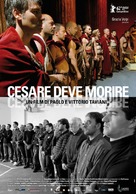Reviews provided by RottenTomatoes
Manohla Dargis, New York Times: You can only guess what the lines mean to the inmates, who register as atmospheric blanks at best and brutal exotics at worst, even if the tale that they enact with such earnest vigor works because the original tragedy does. Read more
David Edelstein, New York Magazine/Vulture: In a scant hour and a quarter it enlarges your notion of what theater and cinema, what art itself, can do -- it dissolves every boundary it meets. Read more
Joe Morgenstern, Wall Street Journal: What works best is what's readily accessible, the startling power of performers who understand the drama all too well. Read more
Noel Murray, AV Club: In Caesar Must Die, the characters are both actor and audience, looking at themselves through the lens of a centuries-old fictionalization of history. Read more
Peter Rainer, Christian Science Monitor: Prison theatricals are nothing new in the movies, but Caesar Must Die, a quasi-documentary featuring hardened convicts acting out Shakespeare's Julius Caesar, is in a class by itself. Read more
Tom Long, Detroit News: There's an intensity and emotional accuracy to the performances that's just stunning, particularly Striano's Brutus, as he longs for death and release. Read more
David Rooney, Hollywood Reporter: Moving away from the literary costume dramas that have been their principal terrain for many years, the Taviani Brothers explore a fascinating encounter between theater and reality. Read more
Kenneth Turan, Los Angeles Times: Ranks among the most involving adaptations of Shakespeare ever put on screen ... Read more
Stanley Kauffmann, The New Republic: It is almost an impertinence to think that we understand the thoughts of these actors and those in the audience who are relatives and friends. But this is the intriguing privilege that the Taviani brothers have given us. Read more
Richard Brody, New Yorker: The movie's predominant black-and-white palette pares the action to its starkest outlines, and a few color sequences reconnect the prison, and the prisoners, to the surrounding world. Read more
Bob Mondello, NPR: The Taviani brothers, Paolo and Vittorio, have been blurring the line between reality and fiction in their films for six decades. Read more
Elizabeth Weitzman, New York Daily News: The Tavianis blur the boundaries between fact and fiction, but they couldn't do it without the full complicity of their actors, or the audience. Read more
Farran Smith Nehme, New York Post: The film gets on screen not only the play's bloody, double-dealing, hungry essence, but the redemptive potential of art. Read more
Colin Covert, Minneapolis Star Tribune: A film somewhere between documentary and neo-realist drama. Read more
Peter Howell, Toronto Star: There's barely a wasted moment in the film, which runs a brisk 76 minutes and contains no female roles. Read more
Nick Pinkerton, Village Voice: So solid is that conception, and so resonant the text in which questions of freedom and slavery are paramount, that the impact can hardly be diminished. Read more

